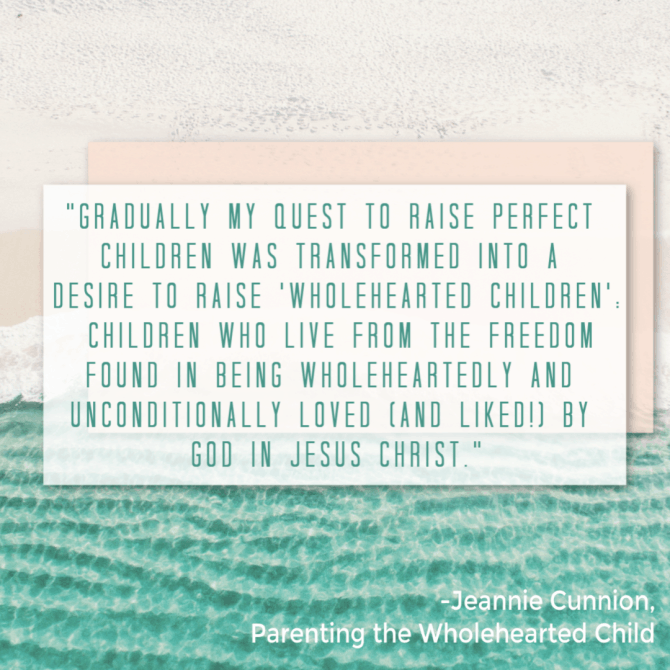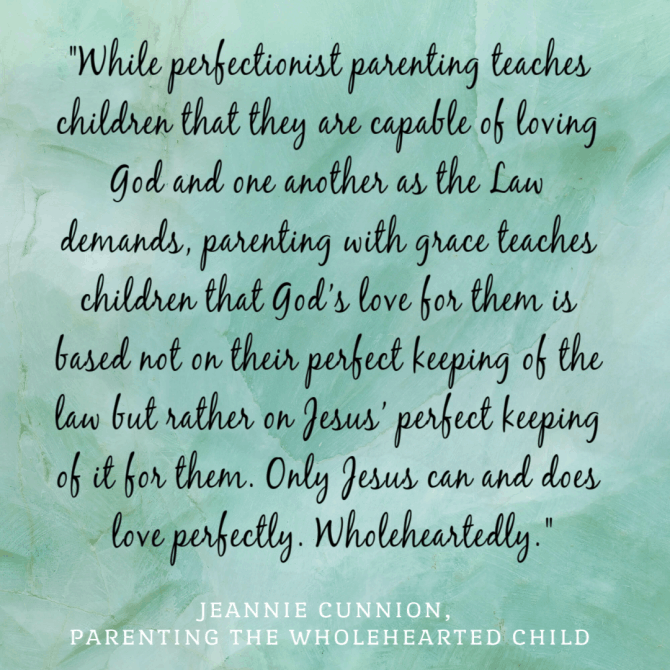As every mom and dad knows, this parenting business is no easy feat. Being Charleston’s mother is the most wonderful, natural thing I have ever done, but it is also the most difficult. There is SO much about motherhood that is hard, and in my efforts to serve my child well, I often find my perfectionistic tendencies needling their way into my expectations for Charleston and for myself as I parent him. In my desire to raise a kind, intelligent, respectful, well-balanced child, it’s easy to fall prey to the belief that this requires ME to be a perfect parent. . . which, of course, is impossible.
Unfortunately, many well-meaning parenting books and blogs fuel this pursuit of perfect parenting. leading parents to mistakenly believe that our children’s hearts, behavior, and even their salvation are wholly dependent on our performance as parents. Thankfully, Parenting the Wholehearted Child is not one of those books.

Jeannie Cunnion was no stranger to the snare of perfectionism. Though raised to believe that she was fully loved by her parents and by God, she lost sight of God’s grace and began linking acceptance to her accomplishments. She gradually grew more concerned with others’ perception of her than who God said she was in Christ, and when she became a parent, her quest for perfection intensified. But it wasn’t long into parenting the first of her three sons that she realized perfectionism was robbing her family of their joy. Slowly she allowed God’s grace to transform her heart and her parenting, and her efforts to raise perfect kids shifted to a desire to raise children who understood that they were fully known and fully loved. Her primary aim as their mom was no longer to see her children perform perfectly, but to help them experience the fullness of life through Christ.
In Parenting the Wholehearted Child, Cunnion leads parents in embracing a grace-based style of parenting in which our children believe God’s love is for them, and that this love isn’t based on anything they can or could ever do, but entirely on what Christ has already done. Ultimately, “knowing that they are fully known and fully loved allows our children to live in the freedom and fullness of Jesus’ unconditional love for them without the burden of perfection, performance, and pretending.”
Cunnion’s gentle guidance and instruction is divided into four sections: Part One helps parents understand the problem of perfectionism and recognize the need for grace; Part Two outlines several practices for helping our children experience a vibrant relationship with Jesus; Part Three offers advice on how to help our children grow in Christlike character; and Part Four helps parents understand how our parenting can be characterized by unconditional love. Woven throughout each of these sections is Biblical wisdom as well as illustrations from Cunnion’s own family.

There are so many great gems in this book, but a few stood out for me. The first was Cunnion’s emphasis on using spiritual disciplines to help our children become friends with Jesus. Prayer, Bible reading, and memorizing Scripture are not acts our children do to “be good Christians”; rather, we are to approach them as ways to connect with Jesus and establish a relationship with Him that is based on wisdom and trust. Cunnion offers a number of creative and applicable strategies for developing these disciplines as a family, and we’ve already begun implementing her ideas—all with the aim of helping Charleston grow in his friendship with Jesus.
In her section on growing in Christlike character, Cunnion reminds readers that “we can’t make our kids grow in Christlike character any more than we can make ourselves grow in Christlike character. Grace alone is what teaches us to say ‘No’ to ungodliness and worldly passions, and to live self-controlled, upright and godly lives in this present age.” However, she does outline six virtues to focus on as we help our kids become more like Christ: respect, self-control, kindness, thankfulness, peacemaking, and honestly. She then provides specific suggestions for encouraging these virtues in ways that are helpful and affirming and that don’t rely on punishment or shaming tactics. Of course, if we hope to see these qualities in our children, we need to embody them ourselves, and Cunnion offers some great tips on how to cultivate Christlike character in ourselves as parents.
Though repetitive, the book’s final chapters (on maintaining authority, instructing our children, and healthy discipline) were the most useful for me. I often struggle to balance these actions with an attitude of grace, and Cunnion offers several helpful examples of how we can maintain order and authority in our homes while still demonstrating grace. I definitely need the reminders to avoid turning into “sin patrol” and to instead focus on Charleston’s heart and what is flowing from it. Cunnion’s suggestions have helped me to reframe my stance on discipline and to alter my reactions to his behavior.

As with all parenting books, much of the content in this one seems too good to be true. It’s impossible to follow Cunnion’s advice exactly, but I don’t think this was the author’s intention. Rather, her goal in writing was to help parents shift our parenting goals to center them entirely on Jesus’ love. His grace covers all of our parenting imperfections, and it extends to our children as they learn to love and serve him wholeheartedly.
My Rating: 4.5 Stars